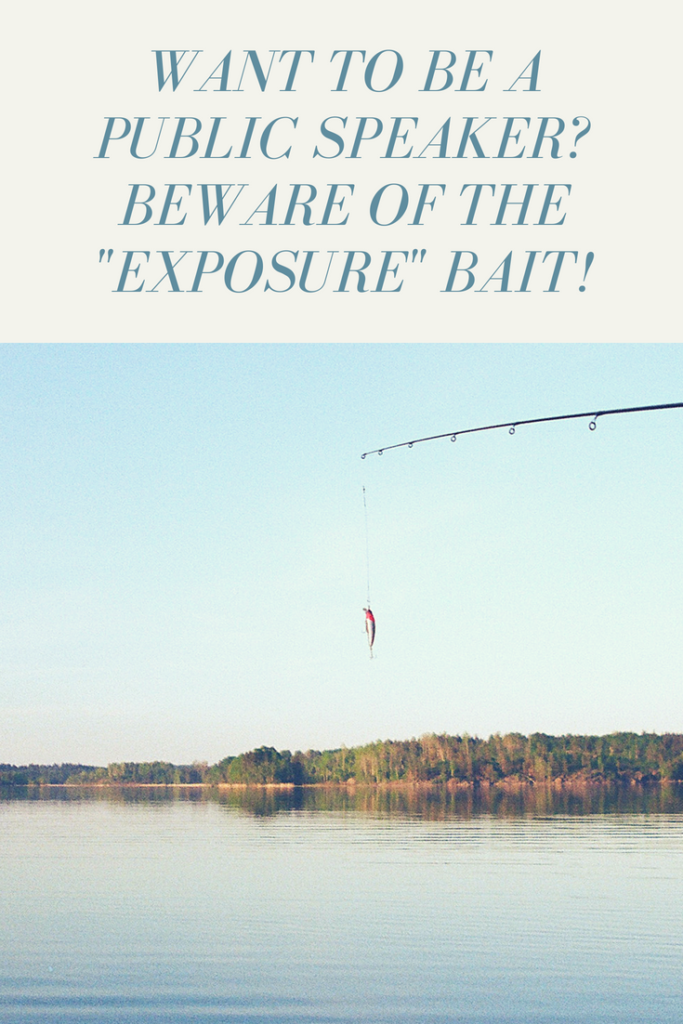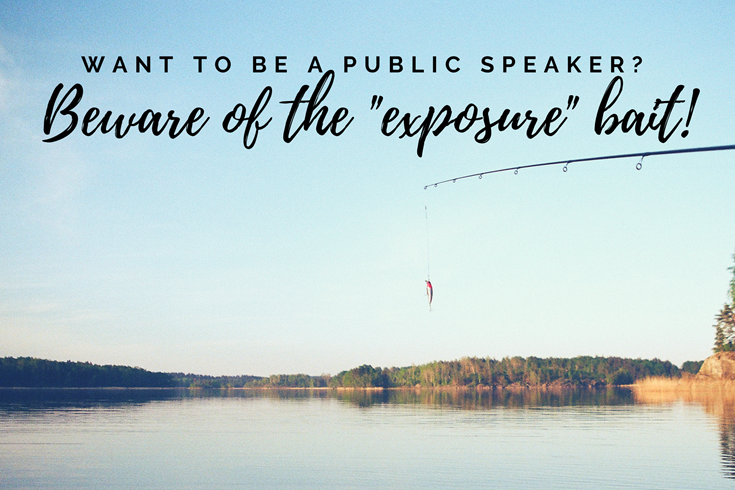|
|
If your career goal is to become a public speaker, or to offer a service where public speaking will be one of your revenue streams, you should first read this.
(And, if your an aspiring singer/songwriter here in Nashville, you should also read this since the same advice will apply to you. You’ll frequently be asked to perform locally for free at various events and charities in exchange for “exposure,” a common request in the music industry.)
Oftentimes independent service providers and industry experts get asked to speak on their particular areas of knowledge to a local group or at a special event. I’ve been called to do so several times. Here’s how the scenario typically plays out.
The Scenario
Caller:
“Hi, I’m Ms. Organizer of the XYZ professional group. We found your web site and we’d love to have you come talk about your area of expertise to our members. Now, we’re not a revenue-generating organization, so we can’t pay you to come speak. But, it will give you GREAT exposure to those in attendance who could be potential clients for you!”
Your Reaction
Which of the following would be your initial reaction if you got this call?
- “Wow! They want ME to come and speak? I’m so honored!”
- “Well, I could use the exposure since I’m still trying to build my client base. It could be worth my time even though I’m not getting paid I guess.”
- “OMG! I’m terrified of speaking in front of groups! I think I’m already having a panic attack!”
- “Last time I spoke to a group they told me it would be great exposure, but it wasn’t. There was no one there interested in any of my services which was disappointing.”
- “There’s no way I’m speaking for free! My time and knowledge is worth more than that!”
Most people’s reaction is typically one of the above emotional reactions, depending on how long they’ve been in business. But when you take the emotions out of the situation, what should your rational response be? Should you take the unpaid speaking gig, or not?
Before we answer that question, let’s consider a few things.
Do you really need the exposure?
It might be early in your business and you need to get your name out there. Therefore, you may have to do a few free speaking gigs, but eventually will have to transition to opportunities that are more of a win-win.
Some people will dangle the bait of “exposure” and try to convince you that “exposure” makes the request a win-win. However, I’ve found in my past experience that the amount of time spent preparing a presentation was never a fair trade for “exposure.”
Is the cause near and dear to your heart?
If you’re being asked to speak to a non-profit or a cause that’s near and dear to your heart, and your expertise will greatly benefit those being served by that non-profit, by all means provide your speaking services for free!
I have developed a great relationship with a local faith-based organization that helps those who are stuck in poverty get out of their vicious cycle of hardship. Every quarter I go in and teach job interview skills and conduct mock interviews with those enrolled in their work-life program.
I know this audience cannot afford my services and I don’t expect them to turn into clients. I provide my presentations to them and the organization as a way to give back to those in need.
While I once used to speak to groups for exposure, I now limit my free speaking services to organizations like the one described above.
Is there another way to get the exposure you need?
Free speaking gigs aren’t the only way for you to get exposure for your business endeavor. There are other alternatives.
For instance, I love to write and it doesn’t require as much of my time as preparing a presentation. I definitely get a much bigger return on my investment of time with writing than I do with any free speaking gig.
I provide a ton of free content here on my blog, on my Medium and Quora accounts, and in several published articles. Since I have clients located in various states, it makes much more sense for me to provide free content online to an unlimited audience than it does to a small audience only in my local area.
In fact, one of my Quora articles providing free resume advice has over 150,000 views and several hundred upvotes. I could never get that kind of exposure with a speaking gig at a local organization!
To Speak or Not to Speak, That is the Question
So back to the question of should you say yes to a request to speak for free?
What kind of win-win situation is potentially available if you agree? Is it one that benefits the organization’s audience while also benefiting you? For example, could this be great practice for a future public speaking career? Or if you later decide to add presentations to your income stream?
How you choose to handle this situation can set the tone for all future speaking gigs. Also, it can either make or break your piggy bank if you get these kinds of requests on a regular basis. You definitely don’t want to develop a personal brand as someone who will do everything for free!
To help you decide on your response, below are a few suggestions I shared from my own personal experience with the Freelancers Union Nashville chapter.
(Freelancers Union is a national organization that protects the rights of freelancers and independent service providers. They helped get the “Freelance Isn’t Free” law passed in New York. This law protects independent service providers from nonpayment. They have ongoing efforts in getting the same law passed in all other states.)
How to Decide
First, wait until the emotions (excitement, uncertainty, fear, etc.) subside before agreeing to anything. Ask for a couple of days to check your calendar and get back to them with an answer.
Then, in those couple of days, spend some time developing your priorities and a strategic plan for agreeing to non-paid opportunities (because if you get one request, you’ll like get more requests!).
Your plan should be made up of two lists: a “SAY YES IF” list and a “SAY NO IF” list.
Say YES if…
The “SAY YES IF” list can include any criteria that make it a win-win situation. Suggestions of criteria to include in this list are:
- If your target market/ideal client is represented in the audience. But don’t take the caller’s word for it. You know your market better than they do. Do your research and ask enough questions to determine if your market will actually be represented.
- If they allow you to promote your own business/services or sell your products at the end of your talk.
- If you get to choose a topic that doesn’t require a lot of time for additional research and preparation on your part. It should be a topic you know well enough to speak on without any notes. If it’s simply a Q&A or a panel with other experts, that’s even better because those scenarios require little to no research or preparation.
- If the prep and delivery time doesn’t cut too deeply into your billable hours. Always keep your paying clients and paid projects your top priority.
- If they offer to give you an honorarium for your time and expertise. It’s okay to ask them if they ever do that for speakers who agree to come speak for significantly less than what you’d normally charge and/or what other speakers would typically charge.
- If the organization is related to a cause that’s near and dear to your heart.
Say NO if…
The “SAY NO IF” list can include the following suggested criteria:
- If at least 3 of the criteria from your “SAY YES IF” list aren’t met.
- If the organization has very specific or unrealistic demands, keeps changing details on you, or does anything else to make things difficult. An example of an unrealistic demand would be them asking you to teach their audience your trade secrets or how to do your job! (I actually received such a request recently.)
- If you’re not allowed to invite participants to visit your web site or subscribe to your newsletter.
Feel free to add your own criteria to each list. Remember, it must be a win-win situation or you’ll become resentful!
Beware though, when enforcing your criteria people may accuse you of having a sense of entitlement. But it’s not entitlement if you’ve worked hard in your industry to gain the knowledge you have. Besides, who’s really the one with the sense of entitlement? Could it be those expecting you to give them something for nothing?
Be Strategic
You don’t want to say yes to every opportunity. Doing so will cause you to not only lose money but also time you could dedicate to your paying clients.
You also don’t want to say no to every opportunity (no matter how fearful you are of public speaking) because you’ll miss out on helping others and also getting your name out to potential clients.
The trick is to be strategic about it.
If you start to get an unmanageable amount of requests, then it’s time to consider doing one or both of the following:
- Include presentations into your business as an additional revenue stream since your topic is in high demand. Then charge accordingly.
- Limit the number of free gigs you do per year to only a few. This will require you to be selective in which organization you want to donate your time and expertise to.
Why You The Public Speaker Are Worth It
Public speaking or performing on a stage can be an extremely stressful thing. In fact, it’s the number one fear, before death at number five and loneliness at number seven.
It can even be stressful for those who love it or have done it for years. Ozzy Osborne has been performing onstage for over 40 years and admits to still getting jitters before every show. Even though I’m energized during or right after a big presentation, I experience a looming sense of dread the week leading up to it.
If you also experience this kind of stress, it can be a tremendous cost to you, including lost sleep or sickness from nervousness.
In addition, you’re sharing your expertise, which is basically your intellectual property. It’s what your clients are already paying you for. You deserve to be paid for your knowledge, and you also need to be fair to your paying clients!
If you have knowledge and expertise that people want, then it’s in demand. Don’t worry if you present it in a different way from other popular speakers. As long as you’re providing something helpful in an engaging way using your own unique approach, then you’re worth getting paid something.
And if none of the above convinces you you’re worth it, then consider this: it’s biblical. Both I Timothy 5:18b and Luke 10:7 states, “the worker deserves his wages.”
Related Post:






